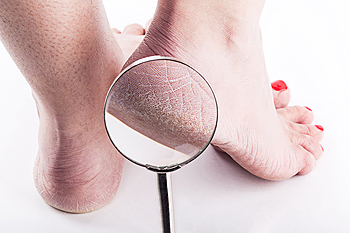
Many people have the foot condition that is known as cracked heels. Various reasons, including vitamin deficiency, can cause this ailment. A lack of vitamin E can affect the skin and cause it to dry. Good sources of this vital nutrient can include sunflower seeds, salmon, avocado, and various oils. Additionally, patients who do not have adequate amounts of vitamin B-3 may develop a condition called pellagra. This can cause the skin to become dry and scaly, affecting the heels. Sources of this vitamin can consist of brown rice, lentils, poultry, and seafood. Existing medical conditions may also lead to developing cracked heels, such as eczema and athlete’s foot. Cracked heels can be prominent among people who frequently walk barefoot and may be prevented when sandals or shoes are worn. If you have cracked heels, it is suggested that you schedule an appointment with a podiatrist who can guide you toward the treatment routine that is correct for you.
Cracked heels are unsightly and can cause further damage to your shoes and feet. If you have any concerns, contact David Lambarski, DPM from Northeast Foot Care. Our doctor can provide the care you need to keep you pain-free and on your feet.
Cracked Heels
Cracked heels appear unappealing and can make it harder for you walk around in sandals. Aside from looking unpleasant, cracked heels can also tear stockings, socks, and wear out your shoes. There are several methods to help restore a cracked heel and prevent further damage.
How Do You Get Them?
Dry skin is the number one culprit in creating cracked heels. Many athletes, walkers, joggers, and even swimmers suffer from cracked heels. Age and skin oil production play a role to getting cracked heels as well.
Promote Healing
Over the counter medicines can help, especially for those that need instant relief or who suffer from chronic dry feet.
Wear Socks – Wearing socks with medicated creams helps lock in moisture.
Moisturizers – Applying both day and night will help alleviate dryness which causes cracking.
Pumice Stones – These exfoliate and remove dead skin, which allows for smoother moisturizer application and better absorption into the skin.
Change in Diet
Eating healthy with a well-balanced diet will give the skin a fresh and radiant look. Your body responds to the kinds of food you ingest. Omega-3 fatty acids and zinc supplements can also revitalize skin tissue.
Most importantly, seek professional help if unsure how to proceed in treating cracked heels. A podiatrist will help you with any questions or information needed.
If you have any questions, please feel free to contact our offices located in Amsterdam and Clifton Park, NY . We offer the newest diagnostic and treatment technologies for all your foot care needs.
